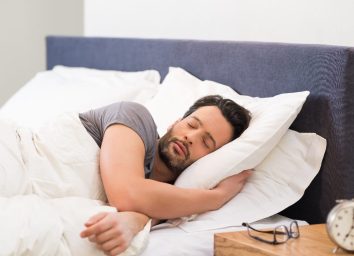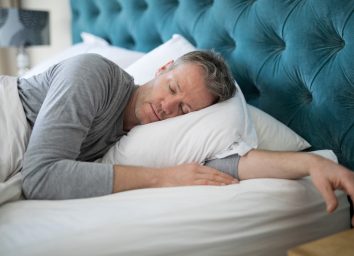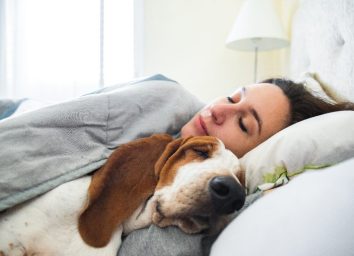Menopause Keeping You Awake At Night? Here’s What You Should Know
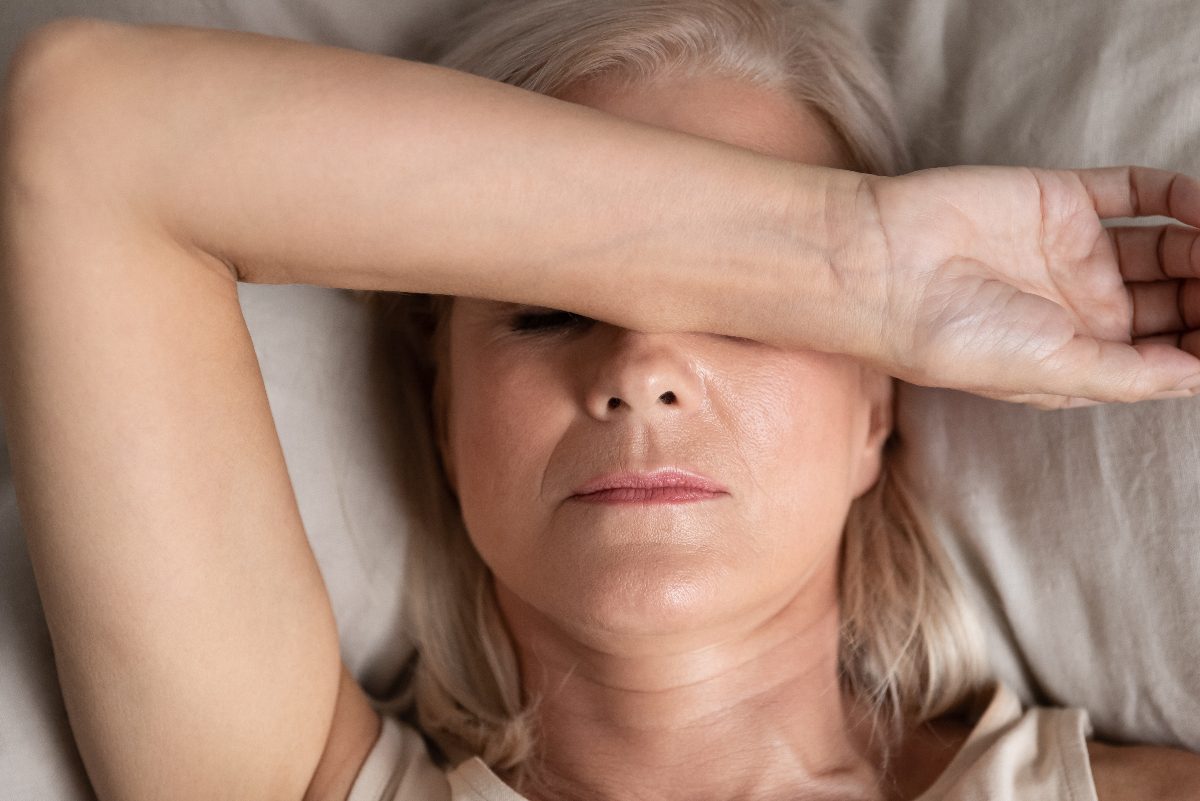
Ahh, the lovely symptoms of menopause. As if it’s not enough fun to put on weight so much easier and deal with hot flashes, mood swings, and urinary difficulties, this stage of life can also bring on insomnia. Sounds like a party that nobody wants to attend. Is menopause keeping you awake at night? Well, don’t stress out, because there are ways you can relieve your symptoms and enjoy a better night’s rest.
Here’s exactly what you need to know if menopause is keeping you awake. And next, be sure to check out The 6 Best Exercises for Strong and Toned Arms in 2022, Trainer Says.
Menopause is a natural change women experience
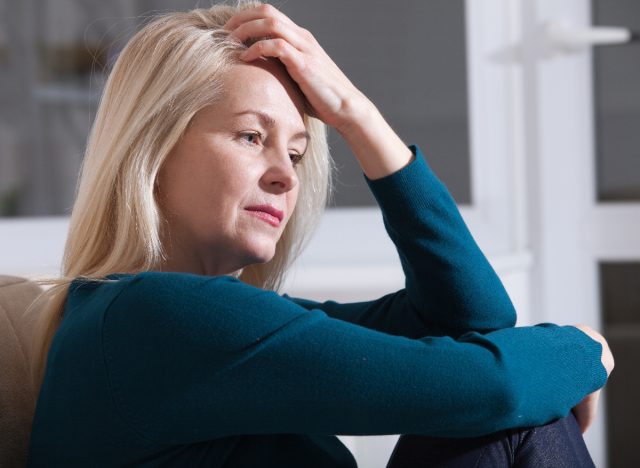
First off, although this may not be a super fun stage of life, it’s a quite normal change women experience, typically between 45 and 55 years of age. According to Women’s Health Research Institute, Northwestern University, during menopause, your ovaries decrease in size and halt the production of the natural hormones that control your menstruation. Your eggs dwindle down, and you become less and less fertile. The end of this transition marks the end of your window in life to become pregnant. It’s no wonder why with all of this happening to your body you will experience unpleasant side effects.
Related: Bad Sleeping Habits That Could Lead To Weight Gain, Expert Says
Your levels of progesterone—a hormone that promotes sleep—decrease
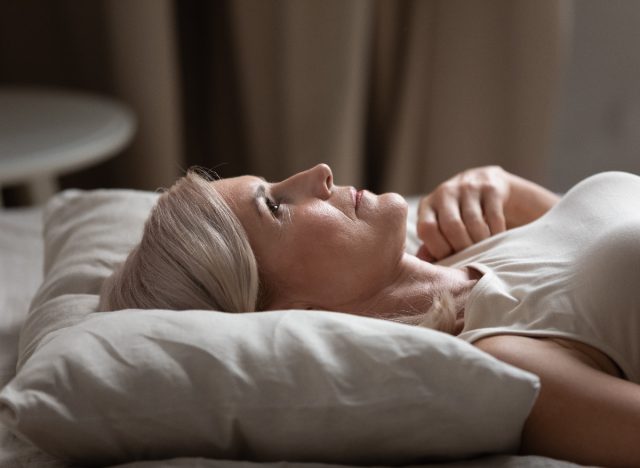
We spoke with Colin Espie, PhD, Co-Founder and Chief Scientist of Big Health and Professor of Sleep Medicine at the University of Oxford to get the scoop on your inability to sleep at this time of life, and he explains what’s happening. “The menopause or associated HRT treatment is a time of major hormonal, physical, and psychological change, so it can often be a trigger for insomnia. Levels of both the female hormones, progesterone and estrogen, drop. Progesterone is known as a sleep-promoting hormone, while the reduction in estrogen can leave you more susceptible to environmental factors that can disrupt sleep, such as light.” And that’s not all. Espie adds, “Hot flashes with their surge of adrenaline and change in temperature can also disrupt your sleep.”
Don’t despair, and know that you’re not alone. According to Sleep Foundation, approximately 12% of women starting menopause encounter sleep issues. When they move to their late 40s into their 50s, it shoots up to 40%. Problems with sleeping become more prevalent, getting worse when moving from perimenopause to post-menopause, at which time women endure sleep issues to the max. Read on to find out what you do to possibly sleep better at night if menopause is causing havoc in your life.
Consider consulting a therapist for cognitive behavioral therapy for insomnia

There’s a way to help people think and behave differently when it comes to sleeping, which can help bring back normal sleep patterns, according to Espie. “By far the most effective long-term solution is cognitive behavioral therapy (CBT) [for insomnia].” It’s important to address the non-sleep issue, because if insomnia is left untreated, it can go on even after you have phased through menopause.
Espie continues, “If unable to see a therapist for cognitive behavioral therapy [for insomnia], there are alternative solutions out there including digital cognitive behavioral therapy (CBT), such as Sleepio, which delivers proven clinical treatments for insomnia like CBT in a digital format, effectively providing evidence-based cognitive and behavioral skills to tackle even the most stubborn of sleeping problems without needing a therapist or coach.” Espie is one of the experts behind Sleepio, and credited as being “one of the world’s leading authorities on sleep at the University of Oxford.”
Sleepio has received a lot of positive praise from reviewers, such as, “Sleepio has changed my life—seriously,” according to someone who experienced sleep issues for three years; “The best gift to myself I could ever have given,” from an individual who experienced sleep problems since childhood; and “You start to see changes within weeks, which is amazing,” from another person who dealt with sleep problems for a decade.
Related: Can’t Sleep? These Are The 3 Best Tips For A Better Night’s Rest
Melatonin, keeping your bedroom temp cool, and wearing lightweight sleepwear can also help
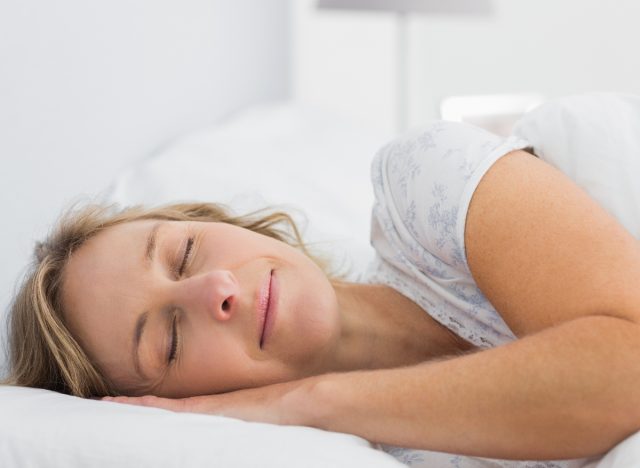
Sleep Foundation suggests taking melatonin, which is a “natural sleep hormone.” It can be purchased over the counter and aids some women with sleeping while promoting a mood boost.
In addition to melatonin, Sleep Foundation offers more helpful tips. For instance, it’s important to keep your bedroom nice and cool, and wear lightweight sleepwear. Maintain a healthy diet, watch your weight, and stay away from caffeine, nicotine, and alcohol. Exercising, such as yoga, proves to be extremely beneficial. Avoid stress whenever you can, and attempt to implement a relaxing bedtime routine for yourself before dozing off. Try to use the bathroom before you head to sleep, and avoid drinking a few hours before you cuddle up under the covers.
If you’re not sleeping during this time of life, the more suggestions you try, the better chance you will find helpful remedies to attain a more restful sleep pattern!

